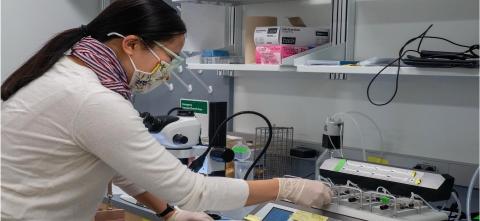
Rapid Action and Partnerships: MSU’s Role in the National Response to Avian Influenza
When highly pathogenic avian influenza, or HPAI, first appeared in U.S. dairy cattle, it shocked the scientific community. The virus, long associated with birds, had crossed a species barrier no one anticipated. In Michigan, however, the response framework was already underway.

How Reliable is AI Information?
While artificial intelligence, or AI, tools like ChatGPT might be great for helping you pick where to go for dinner or which TV show to binge watch, would you trust it to make decisions about your medical care or finances? As AI tools become smarter and gain more widespread use in daily life, so do the stakes for the accuracy and dependability of using this evolving technology.

‘Evolution Under a Microscope’ Continues to Thrive
Evolution is usually far too slow to witness in a single human lifetime — but not in this lab. For over three decades, researchers have watched E. coli transform across more than 75,000 generations. Their Long-Term Evolution Experiment opens a rare window into how life adapts and innovates in real time. What happens inside these 12 unassuming flasks is reshaping how scientists understand evolution in the world’s most complex environments.

MSU Partners With Georgia Tech on Earthseed Project
Michigan State University has joined the Georgia Institute of Technology in the Earthseed Project, a humanities-centered research initiative that uses Afrofuturist literature to connect horticulture, climate resilience and food sustainability knowledge and practices.

Using Language to Build and Unite
Alex Guo, a third-year undergraduate student in the College of Arts and Letters at Michigan State University, is researching the power of language to build community and advocate for change. Guo represented the College of Arts & Letters at this semester’s Ignite Talks MSU where she presented her undergraduate research project, “Beyond Rhetoric: Building Trans-Affirming Communities.”

Discovery May Transform What Time of Day Doctors Induce Labor
In a discovery that could shift labor and delivery practices around the world, researchers at Michigan State University have found that the effectiveness of oxytocin — a common medication used to induce or speed up labor — depends on the time of day it’s administered, especially for patients with gestational diabetes.

Can AI Tell When Someone’s Lying? Recent Study Says Not Yet
Can an AI persona detect when a human is lying – and should we trust it if it can? Artificial intelligence, or AI, has had many recent advances and continues to evolve in scope and capability. A new Michigan State University–led study is diving deeper into how well AI can understand humans by using it to detect human deception.

7 Long-Term MSU Projects Shape How We See the World
At Michigan State University, some discoveries take decades — even centuries — to unfold. The university’s roster of long-term projects and experiments range from buried seeds that have sprouted nearly a century and a half later to a decades-old twin registry that is helping researchers make new discoveries about health and psychology. Spartan researchers are committed to examining a wide range of topics that help us better understand the world.
Announcements
